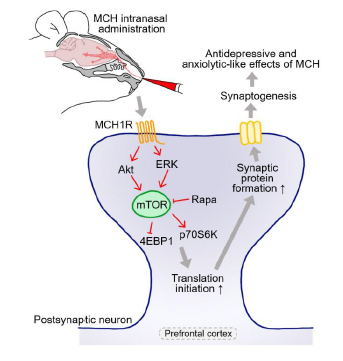Articles
Article Tools
Stats or Metrics
Article
Original Article
Exp Neurobiol 2020; 29(6): 453-469
Published online December 31, 2020
https://doi.org/10.5607/en20024
© The Korean Society for Brain and Neural Sciences
Intranasal Administration of Melanin-Concentrating Hormone Reduces Stress-Induced Anxiety- and Depressive-Like Behaviors in Rodents
Ju-Young Oh1,2,3, Quan Feng Liu4, Cai Hua5, Ha Jin Jeong5, Jae-Hwan Jang1,2,3, Songhee Jeon5* and Hi-Joon Park1,2,3*
1Department of Korean Medical Science, Graduate School of Korean Medicine, Kyung Hee University, Seoul 02447, 2Studies of Translational Acupuncture Research (STAR), Acupuncture & Meridian Science Research Center (AMSRC), Kyung Hee University, Seoul 02447, 3BK21 PLUS Korean Medicine Science Center, College of Korean Medicine, Kyung Hee University, Seoul 02447, 4Department of Neuropsychiatry, Graduate School of Oriental Medicine, Dongguk University, Gwangju 38066, 5Department of Biomedical Sciences, Center for Creative Biomedical Scientists at Chonnam National University, Gwangju 61469, Korea
Correspondence to: *To whom correspondence should be addressed.
Hi-Joon Park, TEL: 82-2-961-9435, FAX: 82-2-961-0916
e-mail: acufind@khu.ac.kr
Songhee Jeon, TEL: 82-61-379-2862, FAX: 82-61-379-2753
e-mail: jsong0304@jnu.ac.kr
This is an Open Access article distributed under the terms of the Creative Commons Attribution Non-Commercial License (http://creativecommons.org/licenses/by-nc/4.0) which permits unrestricted non-commercial use, distribution, and reproduction in any medium, provided the original work is properly cited.
Abstract
Major depressive disorder is a complex neuropsychiatric disorder with few treatment options. Non-targeted antidepressants have low efficacy and can induce series of side effects. While a neuropeptide, melanin-concentrating hormone (MCH), is known to exhibit regulator of affective state, no study to date has assessed the anti-depressive effects of MCH in a stress-induced depression model. This study aimed to evaluate the pharmacological effects of intranasal administration of MCH on depression-related behavior in stressed rats and mice. Using a number of behavioral tests, we found that MCH treatment significantly decreased anxiety- and depressive-like behaviors induced by stress. Notably, the effects of MCH were equivalent to those of fluoxetine. MCH treatment also restored the activity of the mammalian target of rapamycin (mTOR) signaling pathway and normalized the levels of synaptic proteins, including postsynaptic density 95, glutamate receptor 1, and synapsin 1, which were all downregulated by stress. Interestingly, the protective effects of MCH were blocked by the mTOR inhibitor, rapamycin. These results suggest that MCH exhibits antidepressant properties by modulating the mTOR pathway. Altogether, this study provides an insight into the molecular mechanisms involved in the antidepressant-like effects of MCH, thereby paving the way for the future clinical application of MCH.
Graphical Abstract

Keywords: Depression, Mammalian target of rapamycin (mTOR), Melanin-concentrating hormone (MCH), Stress, Anxiety, Rapamycin


